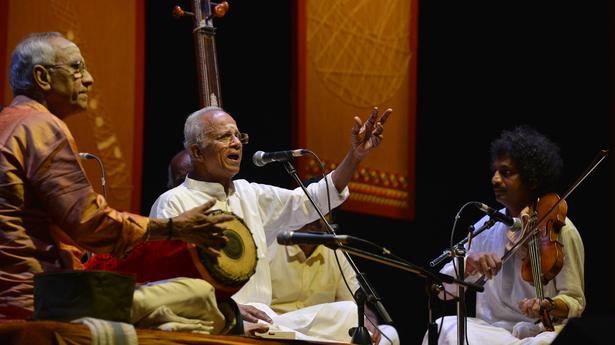
A disciple recalls what it was to train under T.V. Sankaranarayanan
The Hindu
T.V. Sankaranarayanan insisted music should be practiced on one’s own terms
‘To me, your music never can be old, For as you were when first your note I heard, Such seems its beauty and freshness still.’
This was the message I had sent to my guru, T.V. Sankaranarayanan, on his birthday last year, wherein I had tweaked Shakespeare’s lines from Sonnet 104. I couldn’t have found a better expression to describe his music, which remained refreshing, even if you had heard the same list of songs at his many concerts. The passing away of my guru, affectionately called Raman by those close to him, has left a huge void in the world of music. For a disciple, who always experienced the world coming to a standstill momentarily when he chanted ‘Hari’ at the end of a viruttam, it was devastating to see the ever-smiling and energetic master lying still.
Every moment spent with my guru and all those years of intense learning now fill my mind. As one of his early disciples, I have had interesting conversations with him. He used to talk on music, life and everything under the sun and amaze me with his clarity on every subject.
When he took me on as his disciple, I had already performed a few concerts, but quickly adapted to the task of accompanying and serving my guru, many a time strumming the tampura. I distinctly remember my first class with him, he taught me ‘Vigneswara shubhakaaraka’ in Arabhi composed by Tulaseevanam. Soon after, he had to go to Madurai for a wedding concert and told me to come along.
I learnt a lot by observing him closely while he performed and when he interacted with legendary musicians and accompanying artistes. The years spent with my guru made me realise that my learning never stopped with music, it was more about imbibing precious life lessons. He always insisted that I find my own self in art and avoid copying his stage mannerisms. This advice proved to be a turning point in my musical journey. It pushed me to discover myself as a musician.
He would talk about many of the talented young musicians then. I remember his unalloyed appreciation of a concert by Sanjay Subrahmanyam. When I composed a thillana in raga Vasantha in my early twenties and hesitantly sang in front of him, he was very happy and told me to include it in my maiden album.
A busy performing artiste that he was, there was just time for informal brief lessons, but the Begada he sang leaning on a pillar in the porch of his house and the ‘Ariyakudi-ish’ Thodi that he sang while I drove him to the Central Station are firmly etched in my mind. In fact, he could sing spontaneously snatches of the expositions of yesteryear legends with true fidelity. His full-throated singing and emotional approach to music guided me like a lodestar in following the Madurai Mani Iyer tradition.

nyone trying to slot Hong Kong filmmaker Ann Hui into a particular genre will be at a loss, for all through her 45 year-long career, she has moved easily between varied spaces, from independent cinema to the mainstream, from personal films to a bit of action too. For that matter, she has made a horror film too. Ask her about it and the 77-year old, who was conferred with the 29th International Film Festival of Kerala (IFFK)‘s Lifetime achievement award, says with disarming candour that she was just trying to see what she was good at.










